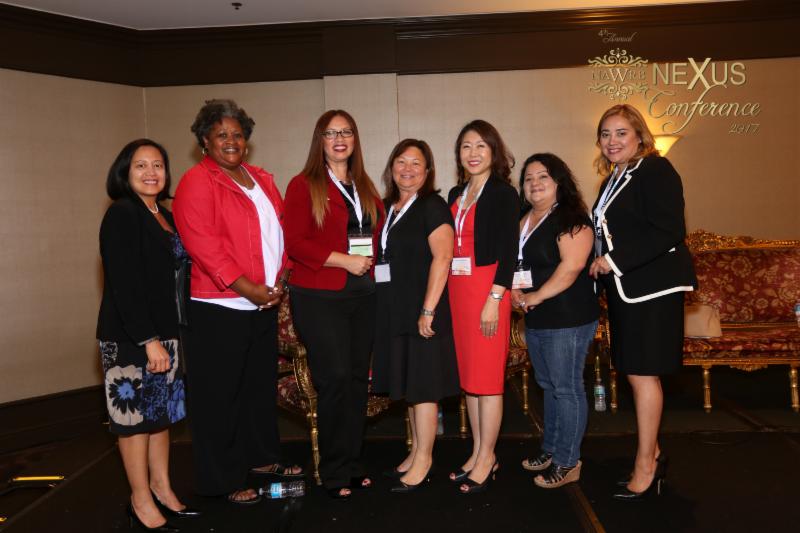NAWRB wrapped up its last session of the day before the 2017 Roaring Thirty Awards Gala, Women’s Homeownership, Fastest-Growing Segment, by communicating the value of women as a home buying market and providing personal accounts from women who turned their homeownership dreams into reality.
Speakers Vanessa Montañez, Business Consultant, former VP, Mortgage Business Development Manager, East West Bank; Stacey Walker, Director, Housing Outreach, Affordable Lending, Access to Credit Single Family Business, Freddie Mac; Helen O’Sullivan, President & CEO, NeighborWorks Orange County; Hyepin Im, Founder, FACE/KCCD; Alicia Lopez, Branch Manager, Wells Fargo; Hope Atuel Executive Director, AREAA ended the first day of sessions with a bang.
Montañez began with opening remarks, introducing the panel, and addressing how homeownership is alive and well with women despite their disadvantages. Although single women buyers outpace single men in the market, men’s homes are worth 10 percent more and appreciate 16 percent faster than women’s.
Helen O’Sullivan described the story of the Reyes family, which was impacted by a divorce in the family. Melanie Reyes and her three children utilized NeighborWorks Orange County as a resource to make sound financial decisions and eventually transition into homeownership.
Monique Ruelas followed by sharing her own experience with NeighborWorks Orange County. Owning a home became a reality for Ruelas when she went through a divorce. She was encouraged to attend a NeighborWorks Orange County class and enrolled in a 10-month program that ended with her purchasing a home. She told attendees to make sound financial decisions, reminding them that you don’t need 18 pairs of shoes or purses. She encouraged women to give up what they did not need and budget so they could save money.
Ruelas truly envisioned becoming a homeowner after the NeighborWorks course; they walked her through the entire process and she was able to learn about topics she didn’t have knowledge about before. The homeownership process empowered her entire family, and she was able to help her daughter Emily purchase her first home at 23 years of age.
O’Sullivan shared that it wasn’t until last year that she was prompted to think about women’s homeownership. She is very proud that 74 of NeighborWorks Orange County’s homebuyers in the last year were women, and most of them were single mothers.
Hyepin Im stated that she focuses mostly on people of color, but that one of their first success stories was that of a mother: this woman’s diligence and perseverance allowed her to buy a home and propelled her life, eventually helping her become a successful business owner as well. Im had the example set by her mother, who was able to purchase her own home, and eventually bought a home with her mother’s assistance after completing her MBA.
Alicia Lopez confirmed that women want independence and want to be empowered through homeownership. She emphasized that it’s all about education and spreading awareness, especially among the young generation. She tasked attendees with educating their children on financial literacy, sharing that she was taught to buy a home before buying a car.
Stacey Walker mentioned HMDA data, which reveals that an increasing number of older women are increasing in buying activity. Walker reiterated that many agents provide home buying education, and a large percent of the buyers seeking these resources are women searching to solidify their accomplishments and create better lives for themselves and their families.
Hope Attuel spoke on Asian women who are coming to the U.S. to work, and the fact that their median income is high, at a little over $100,000. As these women progress, they will achieve homeownership and capitalize on its benefits. Attuel believes women, not just those of the AAPI population, hold tremendous value to the industry and encourages professionals to reach out to this market by leveraging the business tools at their disposal.
O’Sullivan provided a bit of history, describing that when she began her career, homeownership forms were all structured under the assumption that the buyers were a husband and a wife. As the industry has developed, it has grown to recognize that there are other buyers besides a husband and a wife. The housing ecosystem must continue recognizing these buyers and empowering them on their homeownership journey.
Lopez encapsulated the truth that education isn’t only for consumers; it’s for professionals as well. The industry must be able to provide answers to consumers who do not currently qualify to buy a home; they must be the solution to the problem, Lopez emphasized. If professionals do not have the right knowledge, they are not doing their job.
Homeownership is an invaluable contributor to generational growth. The stability owning a home provides for a family carries through generations, contributing to healthier, more successful children who transport its impact into the future.
With these incredible stories and resources, our speakers communicated the impact of homeownership on the lives of women, as well as the power of becoming educated and leveraging the resources at your disposal. We encourage all women to believe in their ability to become homeowners and utilize the tools available to transform their dreams into reality.

 Login
Login

